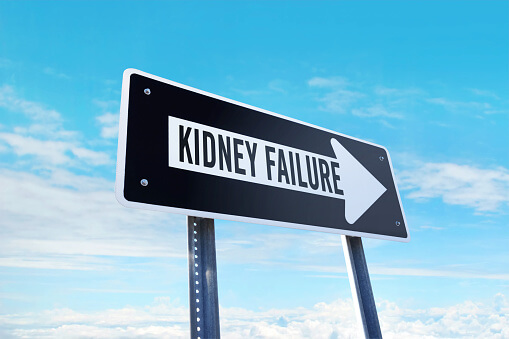Life is About Avoiding Failure, Especially Kidney Failure
8 years ago | Kidney Health
By Joy Stephenson-Laws, JD, Founder
Bill Cosby is in the news again. This time it’s not about the sexual assault allegations against him. Unfortunately, Cosby and his wife, Camille, recently lost their daughter, Ensa Cosby, to renal disease. She was a mother and just 44-years-old.
(You might recall Cosby and his wife previously lost another one of their five children. Their son, Ennis, was murdered during an attempted robbery in Los Angeles in 1997. He was only 27 when he died).
I can’t think of anything worse than a parent having to bury their child. As parents, we work tirelessly to protect our kids and hope that they can live a long, happy and healthy life. But, of course, things happen beyond our control.
When I heard that Ensa died at such a young age of renal disease, also called chronic kidney disease or chronic kidney failure, I wanted to know more about this disease and how we can be proactive about preventing it.
So what is renal disease?
Renal disease is a broad term for conditions that damage your kidneys. You were born with two kidneys (located near the middle of the back, below the rib cage), and each one is about the size of a fist.
Your kidneys perform a very important role in your body. According to the National Institutes of Health (NIH), the main responsibility of the kidneys is to filter extra water and wastes out of your blood to make urine. The kidneys make your body work properly by keeping various nutrients you get from our food in balance. These nutrients include calcium, phosphorus, sodium and potassium.
“Your kidneys also make hormones that help control blood pressure, make red blood cells, and keep your bones strong.”
Reportedly, the kidneys process around 40 gallons of fluid every day! When blood passes through the kidneys, they turn on their filtering powers and hold on to substances the body needs, such as those critical nutrients.
Toxins and extra water may build up in the blood of someone who has kidney disease. And the possible lack of hormone production can also cause health issues.
Reportedly, 30 million American adults have chronic kidney disease and millions of others are at an increased risk. Some reports say that Ensa had a “history of medical problems” and may have been waiting for a kidney transplant.
What are the causes and risk factors of chronic kidney disease?
Chronic kidney disease is often caused by having high blood pressure (and having chronic kidney disease may cause high blood pressure) and/or diabetes. Having a high blood glucose can damage the blood vessels in your kidneys. Diabetic kidney disease is the leading cause of kidney disease, according to the NIH. About 1 out of 4 adults with diabetes has kidney disease.
According to the National Kidney Foundation, African-Americans and Blacks are three times more likely to suffer from kidney failure than Caucasian people due to having higher rates of diabetes, high blood pressure and heart disease.
The normal aging process is associated with a decrease in kidney function. Kidneys suffer multiple effects of aging (from age 30 onward), including a decrease in mass of about 25 to 30 percent. The filtering ability of the kidneys may also be negatively impacted with aging.
Other risk factors of chronic kidney disease include:
- Alcoholism and illegal drug use.
- Overusing certain medications. Your kidneys could be damaged if you take large amounts of over-the-counter medications, such as aspirin, naproxen and ibuprofen.
- Urinary tract issue, like prolonged obstruction of the urinary tract due to an enlarged prostate, kidney stones and some cancers.
- Family history of kidney failure.
Acute kidney failure occurs suddenly and does not develop over time like chronic kidney disease. Causes of acute kidney failure include severe or sudden dehydration, injury from poisons or certain medications and drug and alcohol abuse.
What are the symptoms of chronic kidney disease?
Some symptoms may include:
- Fatigue
- Nausea
- Pain or pressure in your chest
- Seizures
- Shortness of breath
- Swelling of the feet and ankles
- Too much urine or not enough
- Difficulty sleeping
So how can we be proactive about kidney health?
Your doctor can have you do blood and urine tests that specifically check for kidney disease.
One of the best things you can do to prevent kidney disease is to make sure you have a healthy blood pressure. And of course, one way to have a healthy blood pressure is by having a healthy diet (particularly, a heart-healthy diet).
If you are eating to take care of your heart, you are also helping take care of your kidneys. Eating a diet rich in fresh fruits and vegetables, which are nutrient-dense and full of antioxidants, is extremely important.
Reducing the intake of sugar and processed foods may also greatly reduce your chances of developing kidney disease. And staying physically active can also help protect the health of your kidneys.
And if you need yet another reason to quit smoking, smoking cigarettes can increase your risk of developing kidney disease.
Finally, maintaining good nutritional balance is key. You want to make sure that you do not have any nutrient imbalances. If you are nutritionally balanced, this will help protect your heart, kidneys, lungs and basically every organ in your body.
Take a nutrition test. Once you know your results, you can work with a competent healthcare professional to possibly tweak your diet and/or take good quality supplements.
Enjoy your healthy life!
The pH professional health care team includes recognized experts from a variety of health care and related disciplines, including physicians, attorneys, nutritionists, nurses and certified fitness instructors. This team also includes the members of the pH Medical Advisory Board, which constantly monitors all pH programs, products and services. To learn more about the pH Medical Advisory Board, click here.







